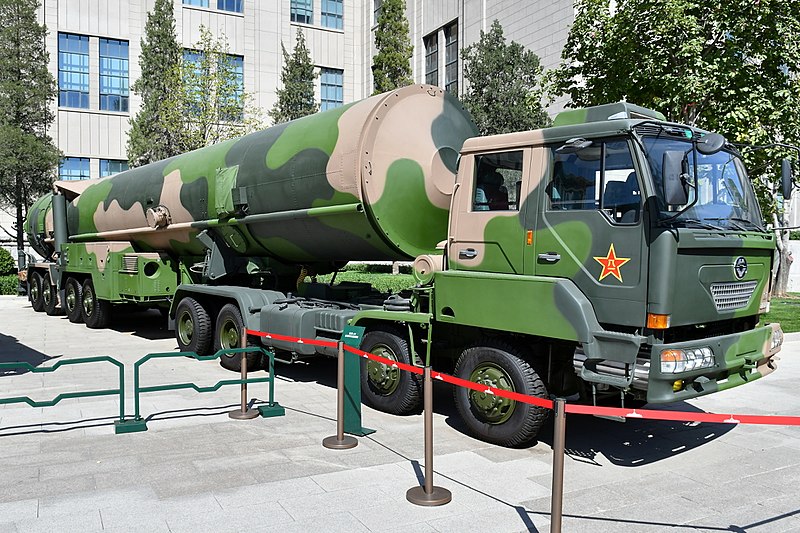 Photo by Tyg728, CC BY-SA 4.0
Photo by Tyg728, CC BY-SA 4.0
How Much Should We Worry About “China, China, China”?
During his March 14th Senate testimony, U.S. Secretary of Defense Patrick Shanahan insisted that the U.S. should now direct its defense spending towards “China, China, China.” Shanahan’s perspective is also shared by commander of U.S. Army Pacific, General Robert Brown, who recently confirmed that China is, indeed, the U.S. Army’s current priority.
One of the reasons behind the U.S.’ concern is China’s recent attempt to increase its nuclear capability. In the last few years China has been working on the enlargement of its nuclear arsenal, through what has been described as an “ongoing nuclear build-up.”
How is China expanding its arsenal?
Some of the recent improvements consist of, but aren’t limited to, mobile nuclear weapons equipped with multiple warheads, a new generation of nuclear-powered submarines, and hypersonic boost-glide vehicles. However, due to China’s renowned lack of transparency, we cannot be completely sure of what its stockpile consists of.
That being said, two elements of China’s growing arsenal concern the U.S. more than others, the first being nuclear-capable long-range bombers. According to Shanahan, China is in the process of developing them and, if successful, it will join the U.S. and Russia amongst the nations with air-, sea- and land-based nuclear arms.
Secondly, the U.S. is concerned with China’s ground-launched missiles which, amongst the ballistic and cruise missiles, make up more than 2000 units – more than either the U.S. or Russia own. Because of such disproportion, Senator Tom Cotton has recently declared that the U.S. must “regain its strategic advantage” by developing and deploying new ground-launched missiles.
While it’s true that China might have a numerical edge in this area, it’s also important to realize that 1) the U.S. possess more than enough nuclear weapons to deter China from ever employing its missiles; 2) China wouldn’t be able to load the vast majority of its ground-launched missiles with a nuke even if it wanted to, due to its limited quantity of nuclear weapons; 3) even in the extremely unlikely event that China isn’t deterred by the U.S.’ arsenal, China’s ground-launched cruise missiles and IRBMs do not pose a primary threat to the U.S. mainland.
Why is China expanding its arsenal?
It is important to understand the reason(s) why China feels the need to enlarge its arsenal. For one, China has high aspirations for international power, and it now feels like its comparative nuclear disadvantage versus the U.S. and Russia is incompatible with those ambitions.
Moreover, the Chinese government deduced from comments by National Security Adviser John Bolton and other officials that part of the reason why the U.S. pulled out of the INF is the nuclear peril presented by China. China, therefore, sees the U.S.’ exit from the treaty as a national security threat, which may contribute to the escalation of its nuclear armament.
Lastly, China feels threatened by the U.S.’ decision to produce low-yield nuclear arms. These weapons are, in fact, protagonists of a triangle of mistrust: Russia intimidates the U.S. with the possibility of a battlefield nuclear attack carried out with a low-yield weapon; the U.S. decides to produce its own low-yield devices so that it’ll be able to have a proportional response to a possible Russian attack; and China, while not directly involved in that specific deterrence game, feels compelled to produce low-yield weapons, too.
How to prevent a nuclear escalation?
China’s nuclear doctrine has always been based on the concept of minimum deterrence, therefore a strict commitment to a no-first-use policy. That being said, should the U.S. over-react to China’s expansion of its nuclear capabilities, China might decide to broaden its understanding of the no-first-use policy by including a series of conditions under which it would technically be allowed to resort to nuclear arms, or even switch to a launch-on-warning policy. The U.S. should therefore not give China any reason to believe it intends to produce new weapons or missiles. On the contrary, it would be wiser for the U.S. to support the Prevention of Arms Race Act, which prohibits government investments in INF-noncompliant missiles.
We now find ourselves at a stage in which China’s rising military power cannot be ignored, and neither can its ambitious aspirations. It is therefore important for the U.S. not to be discouraged by China’s refusal to sign a multilateral treaty limiting ground-based intermediate-range nuclear missiles, and try to find a way to include China in a context of peaceful diplomatic talks aimed at limiting all the major nuclear powers’ arsenals.





